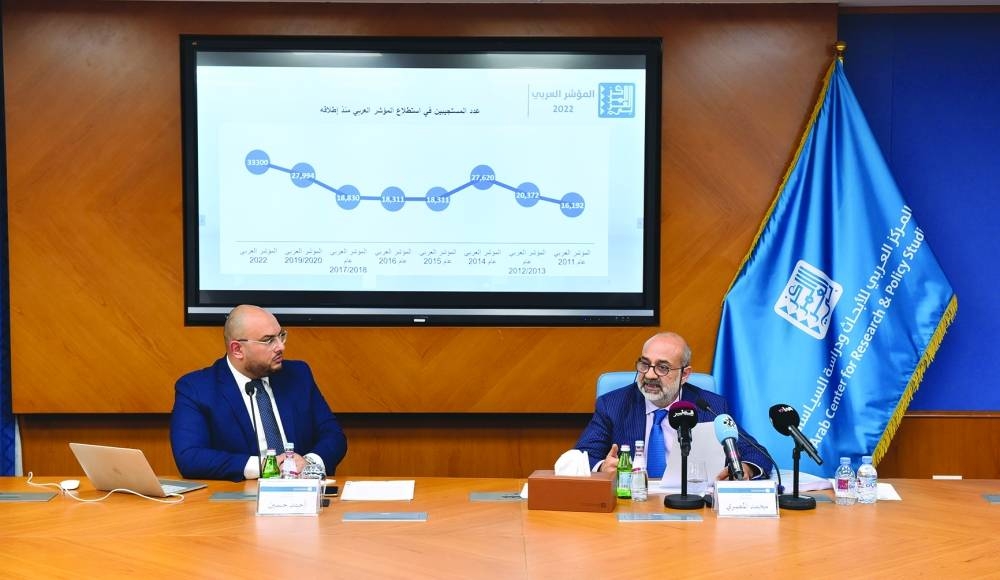The Arab Center for Research and Policy Studies (ACRPS) Tuesday released in Doha the outcomes of the 2022 Arab Opinion Index. The eighth in a series of public opinion surveys across the Arab world, was based on the findings from face-to-face interviews conducted with 33,300 individual respondents in 14 Arab countries: Saudi Arabia, Kuwait, Qatar, Iraq, Jordan, Palestine, Lebanon, Egypt, Sudan, Tunisia, Morocco, Algeria, Libya, and Mauritania.
The Arab Opinion Index remains the largest public opinion survey carried out in the Arab world. Sampling followed a randomised, stratified, multi-stage, self-weighted clustered approach, giving an overall margin of error between +/- 2 % and 3% for the individual country samples. The overall samples guarantee probability-proportional-to-size (PPS), ensuring fairness in the representation of various population segments.
More than 72,000 hours of work were carried for these surveys by a team of 920 individuals, equally balanced in gender. The team covered a total of 890,000km across the population clusters sampled, covering many cities, villages and neighbourhoods at the targeted countries.
The results of the index are presented according to the countries surveyed and according to the general average of each Arab region. For the purposes of comparison, the data of the countries surveyed is classified according to the geographical regions of the Arab world, in particular The Arab Maghreb - Mauritania, Morocco, Algeria, Libya, and Tunisia, the Nile Valley - Egypt and Sudan, the Arab Mashreq - Palestine, Lebanon, Jordan, and Iraq, and the Gulf - Saudi Arabia, Kuwait, and Qatar.
Dr Mohamed al-Masri, executive director of the ACRPS, reviewed the outcomes of the 2022 Arab Opinion Index at a press conference yesterday. He pointed out that the outcomes have to be interpreted within their contexts, taking into consideration the different levels of respondents' interests, their culture perspectives and local circumstances.
On the economic level, around 25% of the respondents said their income covers their basic needs and they save some of it. Around 42% said that their income does not cover their needs and they have to find other means, for instance 83% of those said that they have to borrow from family and friends while 16% rely on the aid they get from various charities.
Regarding the feeling of safety and security in the home country, 61% of the respondents said that they the situation is very good while 30% described the situation as very bad. Around 28% said they want to migrate abroad to improve their living and economic conditions and stay there for a number of years and then return back home. However, 11% of the respondents, especially from those living in Iraq, Lebanon and Libya, said that they want to migrate abroad for political and security reasons.
Regarding the threats to the Arab national security, around 28% of the respondents saw that Israel poses the most threat, 13% saw that the US poses the most threat, and 9% saw that the threat comes from Iran. However, in Egypt, around 20% of the respondents said that Ethiopia poses the most threat for their national security.
The outcomes of the survey indicate there is a considerable trust and confidence at the army, the public security and the judiciary while the trust decreases for the governments and the legislative councils and bodies. Yet, most respondents saw that army and the military should not assume the authority in their countries and they prefer a more democratic system.
Further, the public opinion goes for democracy, which was defined by 85% the respondents as a guarantee of the basic rights, while 20% defined it in terms and justice and equality, 14% defined it as separation of powers, 6% safety and security, and 5% described as improving the economic situation.
As for 2011 revolutions in the Arab World, often known as the Arab Spring, 46% of the respondents evaluate them as positive, and 39% see them as negative. The public positive ratings have dropped over the years due to the development and turns of events across the targeted countries.
Around 77% said they use the internet, 22% said that they do not use it and 44% said they use it on daily basis. According to the outcomes of the survey, 94% of the internet users said that they have social media accounts mostly on Facebook and Twitter with around 77% of the respondents at the GCC region indicating that they prefer mainly Twitter.
The most followed topics are the social issues followed by the political issues. As for trusting these sources, 48% of the respondents said that they only trust the established news platforms, 44% the media persons' pages, only 32 have some trust for the influencers and social media stars, with the trust going to the lowest levels.
The survey also explored the role of religion and religiosity in public life with 61% of respondent described them as religious, 24% very religious and 12% moderately religious. Most of the respondents focused on the ethical aspect of religiosity, and most respondents refused to make religion as the basis for dealing and transactions with others, in addition to rejecting any interference of religion into politics.
Around 76% of the respondents to the survey stressed that the Palestinian Cause is the cause of all Arabs and not the Palestinian's alone. Further, 84% refused to recognise Israel as a state while 8% agreed to recognise Israel as a state on condition of allowing the recognition and establishment of an independent Palestinian state.
As for the ongoing Russian-Ukrainian war, around 44% of the respondents rejected the war and considered it an unjustifiable Russian aggression against Ukraine, while 19% see it a justifiable war against Ukraine, and 37% refused to give any opinion.

Dr Mohamed al-Masri (right) announcing the survey results
